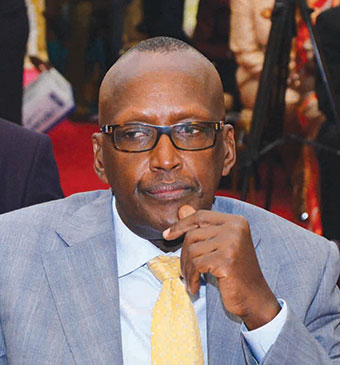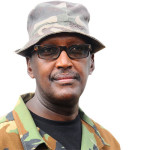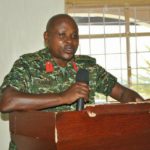The army has withdrawn all security details of former Security Minister Lt. Gen. Henry Tumukunde at his Kololo and Rukungiri homes.
Close sources to the retired army general confirmed the development to Eagle Online that an order to withdraw guards was given last weekend when the Gen. Tumukunde was up-country.
“It is true all the guards have been recalled back to Bombo and we are wondering why now because he is entitled as a retired general” The source told this website on condition of anonymity.
However, Eagle Online has established that the issue at hand pitting Gen. Tumukunde and the Kampala establishment is the rumoured presidential ambition he harbors to run against the incumbent Yoweri Museveni of the National Resistance Movement (NRM) party in 2021.
Apparently the sophisticated army general has silent been mobilizing masses across the country and has been endorsed by some members/ generals of the historical high command who are reportedly silently reportedly opposed to the continued dominance of President Yoweri Museveni.
Eagle Online can authoritatively reveal that as part of the wider plan to encounter the influential and well networked former spy master, there is an alleged raid to his home.
However, we couldn’t verify this information as Brig. Richard Karemire, the army Spokesperson couldn’t be reached on phone.
So who is Gen.Henry Tumukunde
He was born on February 28,1959 in Rukungiri District in the Western Region. He attended Bishop Stuart College Demonstration School for his primary schooling. He studied at Kigezi College Butobere (Siniya) and Kibuli Secondary School for his O-Level and A-Level education, respectively
Tumukunde graduated from Makerere University with a Bachelor of Laws degree in 1981. He obtained a Diploma in Legal Practice awarded by the Law Development Centre in 2010. He also holds an Executive Masters in Oil and Gas Management, awarded by the Graduate Institute of Geneva in 2013.
Joining The NRA guerillas
During his time at Makerere, Tumukunde was involved in anti-government politics, which subsequently led to his joining of then rebels, the National Resistance Army, led by rebel leader Yoweri Museveni. Tumukunde was hounded by the government security services during his last year at the university and on completion, decided to join the struggle, along with two of his friends at the time, Major General Mugisha Muntu and Colonel Jet Mwebaze.
Obote’s security services at the time caught wind of their impending departure for the bush and mounted an attack on the NRA’s transit house (shop) in Kampala. It is said that Tumukunde alongside Muntu posed as shopkeepers, surviving what would have been sure torture and death. In the early stages of the war, Tumukunde was a machine gunner and eventually went on to become one of the senior officers in NRA, indicated by his senior number RA 0111.
Getting shot
In 1985, during one of the bigger battles with the Uganda National Liberation Front in Luweero District, Tumukunde was shot multiple times in his legs. The wounds were so major that it was thought he would not survive. He was, however, smuggled out of the country to Nairobi and eventually to London where he was operated on.
Post-Bush
On capturing power, Tumukunde was promoted to the rank of major and appointed first secretary and military attache at the Ugandan High Commission in the United Kingdom. Subsequently, Tumukunde was sent on a Command and Staff Course at the Armed Forces Command and Staff College, Jaji, in Kaduna, Nigeria from where he emerged as one of the best students. He later on returned to Uganda where he became the Army’s director of planning. Tumukunde served in this role for many years and was very instrumental in the setup of formal military structures in the UPDF, which had until then been a rebel army.
In 1994, Uganda held elections for the Constituent Assembly and Tumukunde sought to represent his home county Rubaabo. His main competitor was Prof. Mondo Kagonyera. Tumukunde, who was in early thirties at the time, was thought to be the underdog in the race; however, Tumukunde was a very good mobiliser and won by a landslide margin. Tumukunde then joined the CA, which formulated the current 1995 Ugandan Constitution. Tumukunde was known to be a regular and astute contributor to the sessions and debates that preceded the formation of the Constitution.
Following the set-up of the constitution, Uganda held elections and Tumukunde subsequently became a Member of Parliament representing the Army as a special interest group. He went on to serve as an MP until 2005. In addition to this, Tumukunde was promoted to the rank of lieutenant colonel and appointed chief of personnel and administration. In 1998, Tumukunde was again promoted to the rank of colonel and appointed chief of military intelligence and security. His tenure was arguably the most successful by any officer as it is during this time that Al-Qaeda’s plan to bomb the American Embassy was thwarted. There was also a time where bombings were rampant within the capital Kampala, and once again Tumukunde formed several intelligence committees within the city and the problem was managed. Tumukunde also built an amicable rapport with the Muslim community, which many had accused of spearheading the attacks, so much so that key intelligence information was forwarded to him with ease. Arguably, it was during his reign that the Ugandan intelligence apparatus was at its most efficient.
Tumukunde was then promoted to brigadier general and transferred to command the UPDF Fourth Division based in Gulu. At the time, the war with the LRA was ongoing and Tumukunde made significant headway during his time as division commanding officer in diminishing the threat of the LRA. It is also at the time when Ebola outbreak was first reported in Northern Uganda and Dr. Mathew Lukwiya and Gen. Tumukunde swung into action but bad enough Dr. Lukwiya lost to the Ebola battle.
Tumukunde was then appointed Director General of the Internal Security Organisation, Uganda’s civil intelligence body. During his time at ISO, Tumukunde set up structures that returned ISO to being the country’s foremost Intelligence gathering body, just as he had done with CMI. The Internal Security Organisation became renowned for its efficient and effective approach towards intelligence and counter-terrorism.
The fall out
Tumukunde’s fast rise to the upper echelons of both the political and military scene in Uganda marked him out as one of Uganda’s most popular and well-known figures and ultimately, this, alongside his very strong minded and unrelenting dedication to his country, brought him into the sights of the very institutions he helped to consolidate.
At a political retreat in 2003, Tumukunde, in the presence of the president and his cabinet, argued against the impending removal of term limits that would give President Museveni the right to stand for re-election on an infinite basis. Tumukunde stated that this would be in direct contravention of the rights that they fought to establish and that he was not willing to take part in what he considered to be grossly unconstitutional behaviour. Predictably, this put him at loggerheads with the establishment and more so the president.
Arrest and detention
Tumukunde was charged with the offences of abuse of office and spreading harmful propaganda. The abuses of office charges were eventually dropped in a manner suggesting that they had been politically motivated in the first instance. What followed was, however, a surprise to many. Tumukunde was on May 28, 2005, forced to resign from Parliament and subsequently arrested on the orders of the President Museveni
His home was surrounded by at least 50 soldiers commanded by then Brig. Kale Kayihura and Brig. Joshua Masaba who proceeded to arrest him. Gen. Tumukunde was then driven in a tightly guarded convoy to an officers mess turned detention center, where he was incarcerated for nearly two years, during which he had limited and tightly controlled contact with the outside world. His extrajudicial detention coupled with a series of controversial and uncertain court martial hearings seemed to backfire leading to irreversible pressure culminating in his release in 2007.
His arrest followed his opposing views to the proposed “third term” project that suggested a revision to the Ugandan constitution enabling one to serve more than two terms as president as was the case at the time.
On April 18, 2013, the UPDF General Court Martial sat to bring an end to the process that had lasted eight years and summed up its deliberations. The charge of spreading harmful propaganda was dropped while the joint charge of military misconduct was upheld and Tumukunde was subsequently sentenced to a severe reprimand.
Promotion and retirement
In September 2015, Tumukunde was promoted to the rank of Lieutenant General and then retired from the Army.
Appointment to cabinet
On June 6, 2016, he was appointed to the Cabinet as the Minister of National Security. He was relieved of his cabinet responsibilities on the evening of Sunday, 4 March 2018, in a presidential tweet, in which his nemesis, General Kale Kayihura, the former Inspector General of Police was also fired.







